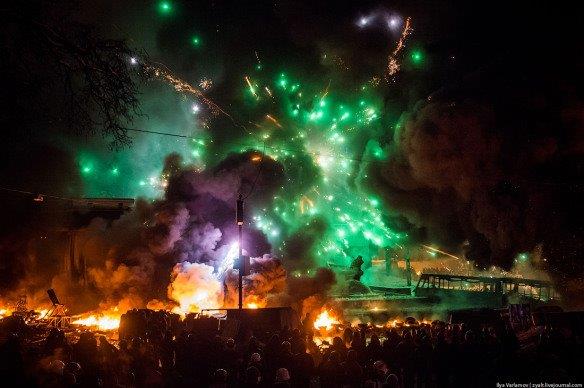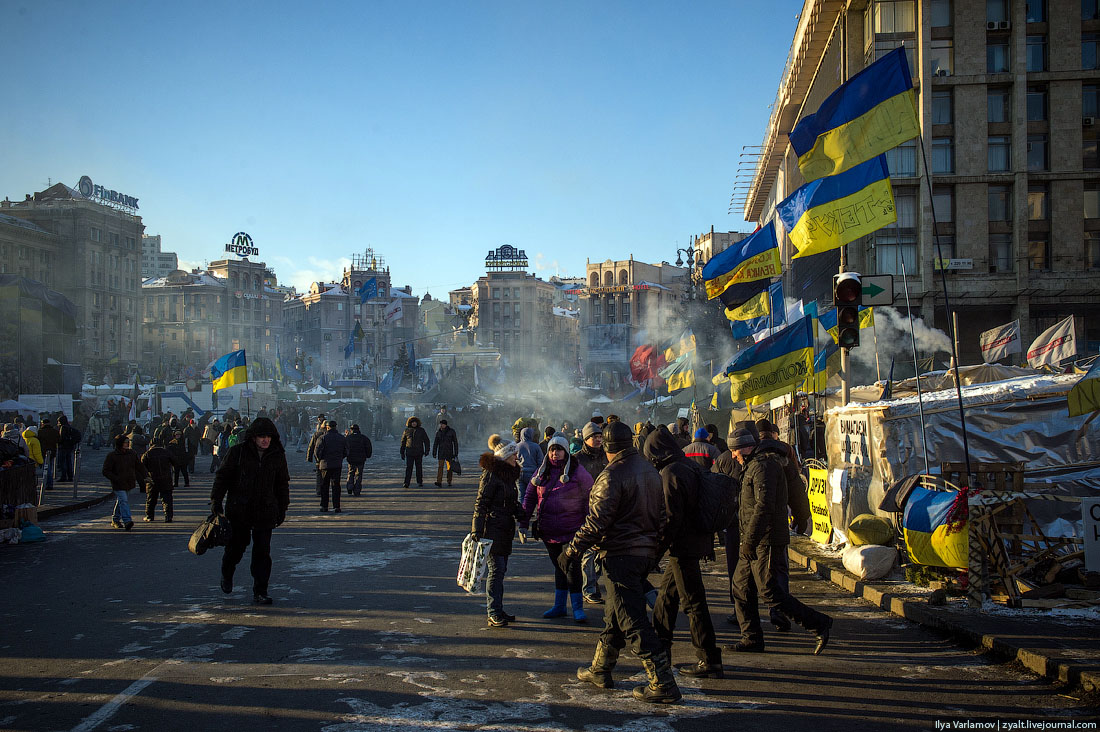Impressions of a Kyiv-born Madrid resident when visiting Kyiv during Spring break.
I knew I would have to write something about the situation back home as soon as I stepped into the crowded check-in antechamber of Madrid Barajas Airport. It’s funny how the realisation that, oh my God, there is an actual military conflict going on where I grew up, hit me quite a ways later than I initially expected – considering all the sensitive jokes about Mariya going back to a war zone for Easter holidays that have followed me around during the last two weeks of class.
I have never been particularly patriotic – though I was born and raised in Kyiv, the capital of Ukraine, I have spoken Russian since birth, with Ukrainian being my second language – or maybe even third, considering how much in love with English I have been since the beginning of my cognitive development. My family speaks Russian, Ukrainian was only used in school and for formal documentation… Yet for the last few months I have been using it exclusively to talk to my friends online. There is something wonderful in finally being able to be openly proud of my nationality – Ukrainians have been suffering from an inferiority complex of sorts as a nation for quite some time.
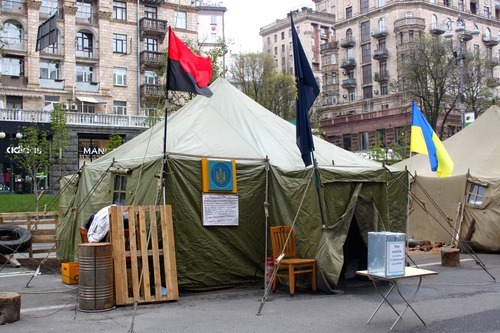
I felt this, this incredible sense of pride and happiness at being home when I approached the passport control desk in Kyiv Borispil Airport. The police officer’s tired, 11 p.m.-old face broke into a huge grin when I addressed him in Ukraine, stumbling over a couple of words due to my rustiness and as a consequence of my four-hour-long layover in Munich. With my passport perfectly stamped, I retrieved my luggage and went to find my mother, who promptly put me behind the wheel to drive us both home from the airport – I missed driving very much, you see, unnecessary as it is in Madrid.
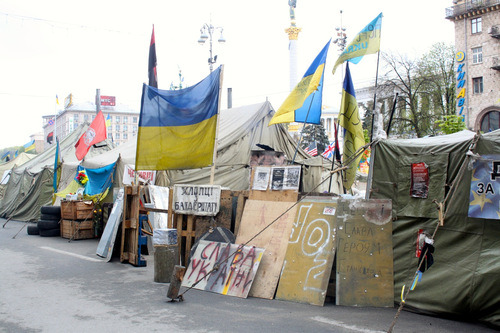
The first thing I noticed on the way home down the Borispil highway was the utter audacity of the billboards scattered left and right along the road. This had never happened before, and my fledgling patriotic mind could not coil itself around the notion that things like, Stop Feeding the Family! (a moniker for Yanukovych’s closest associates), could be written in block letters out in the open like this. Though disagreement with the government had been wide and permeating all social layers before the revolution, to put something like this on a billboard on the country’s best highway, no less, would have required a lot of, erm, cojones.
Another thing I noticed on the way to the city was the sheer lack of electoral propaganda – with the early presidential elections being about a month away. Though I would see some advertising here and there later, the volume of vote for me ads is significantly lower than in the previous years – perhaps the candidates did feel that austerity is the best policy.
Upon arrival home, we switched on the television and I came face to face with the fact that the central Russian TV channels have been suspended from cable broadcasting, having been replaced with pro-revolutionary Ukrainian and Russian media. Though a breath of fresh air, the policy does seem a bit extreme – know thine enemy, right? Overall the news dealt with the Crimean conflict with the occasional heroic report of Self-Defence activists doing something out of character for Ukraine – like helping people, planting trees, cleaning streets etc. The evolution of Ukrainian society in the last few months is emphasised quite a lot: how self-conscious as citizens we have become, striving to live up to the faith the West has seemingly placed into our future.
And it works. When taking a walk down post-revolutionary Maidan, among the numerous tents and shrines to the fallen, I noticed how clean and organised it all was. Shabby, yes, of course; but there was a reverent atmosphere of order down the entire street of Khreshchatyk. Each tent had a guard, a little yard-like perimeter, most had flags installed at the entrance. Some activists were more creative than others, creating whole statues and art exhibitions from protest leftovers. I looked at how the tents were anchored solid in the asphalt of the street – it must have taken tremendous effort to set them up. 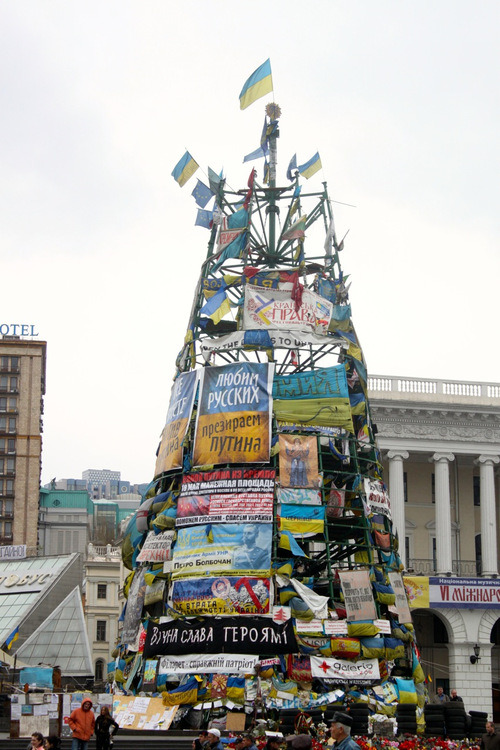
Uniformed, balaclava-clad men walked up and down the streets, some bearing nationalist markings, some carrying batons. Before, I would have shrunk away in terror from such individuals, simply because of how they had always had a questionable reputation. But at that moment, I felt safe. I actually felt better with them being there. I don’t know why. I don’t question my intuition.
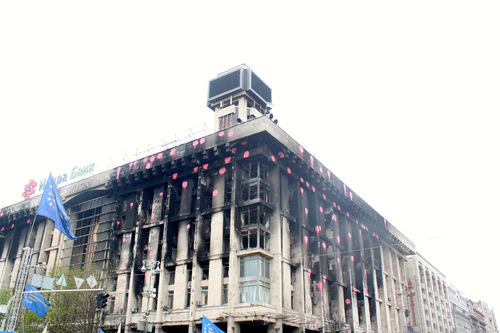
The burnt-out Trade Union building loomed over the main square, blurring out the infamous Christmas tree and the booth. It stuck out like a sore – an awful, aching sore. We still don’t know for sure how many have perished in the fire that engulfed the entire building. We can only guess. And gaze at it with the awe it deserves.
A number of old ladies stood silently by the Maidan booth which has been turned into a memorial for the fallen. The only reminder of the fight still going on is a blue-and-yellow poster with a young man’s face on it, calling for all willing to join the National Guard. The women’s eyes were fixed on a floral wreath placed at the foot of the booth.
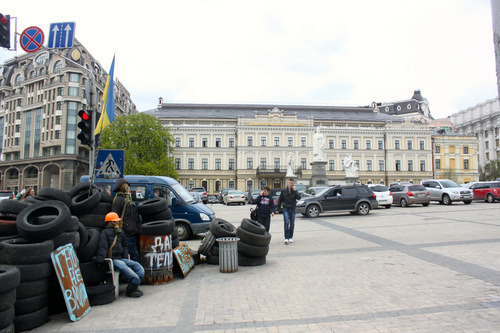
Remnants of ripped-out cobblestones and car tyres were stacked at the entrance to Institutska Street – one of the places I had been both eager and reluctant to visit. This was where the February killings happened. I was there. I was standing on the very ground where, perhaps, someone not much older than myself had been robbed of their life. Though the entire neighbourhood is enveloped in a respectful hush, this particular street had a different atmosphere. I felt as though I were visiting a graveyard. And I was, I realised, as I looked at the poster hanging down from the pedestrian bridge depicting the Heavenly Hundred. Some of the names didn’t have pictures attached to them.
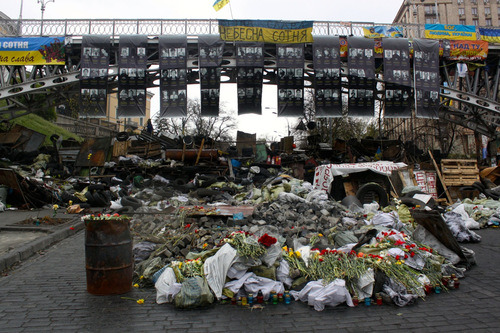
But they had flowers. Lots and lots of flowers. Candles. Icons. Rosaries. Crosses. Lining the street from the very bottom at Maidan and up to the end intersecting Shovkovichna – the street which I had walked every day, when coming home from school.
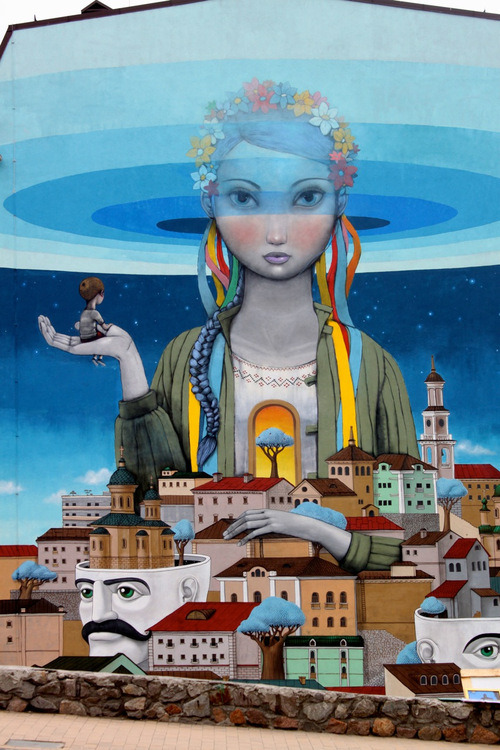
The next day I saw Hrushevskogo – yet another epicentre of battle during the protests. One of the buildings was completely blackened with soot. Cars passed through a narrow archway formed by stacked cobblestones which still had not been replaced. Car tyres – an already familiar picture, – were stacked high next to the restored gates of Lobanovskiy Stadium. A catapult, surrounded by Instagramming tourists, stood awkwardly in the middle of the street. Leading all the way to European Square – a symbolic circumstance, considering; was a line of candles. A memorial to Sergiy Nigoyan, an Armenian activist who had died among the first, has found its place among the green grass along the side of the road. Graffiti in the underground crossing condemns the enemy – the government, – and proliferates the glory of the heroes.
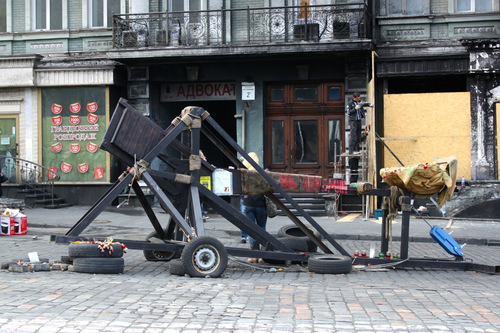
The city centre has never been this quiet.
It is a shrine, a memorial, a museum to the Revolution of Dignity.
It is testament to days past, a battle that we thought had ended.
Who knew we had bigger foes to face.
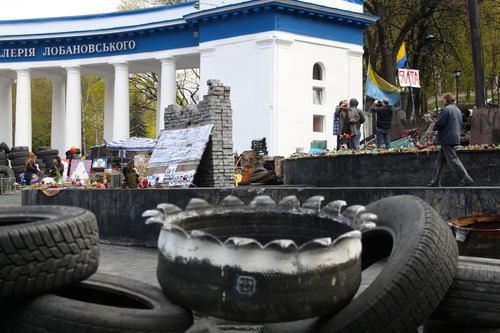
Your Mariya Shcherbinina





